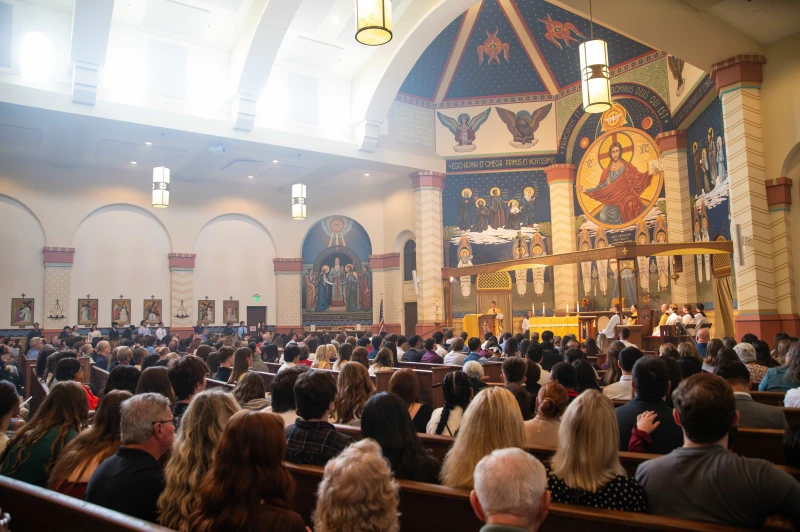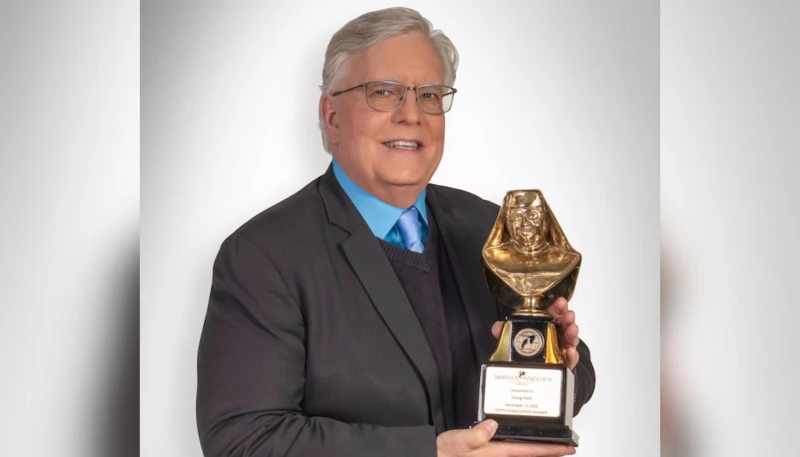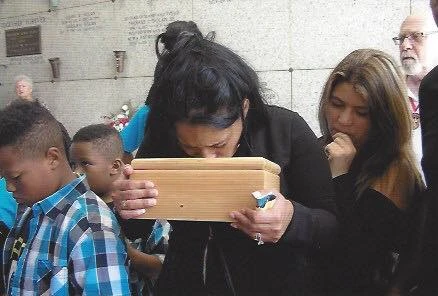

Mass at Arizona State University’s Newman Center chapel. / Credit: Photo courtesy of Father Bill Clements, director of ASU Newman Center
Ann Arbor, Michigan, Dec 15, 2025 / 07:00 am (CNA).
Several college campuses across the country are witnessing a notable rise in baptisms and confirmations among students. Catholic evangelists tell CNA that this growth reflects a deepening desire among young adults for certainty, stability, and faith amid today’s turbulent cultural landscape.
For example, at Arizona State University, the Newman Center is experiencing its largest group of students entering the Church. Ryan Ayala, a former seminarian and campus minister who has served at ASU for three years, oversees the evangelization efforts.
“This past semester, we welcomed 52 students into the Church at Christ the King Parish” in Mesa, Ayala said. “And we are expecting 50 more for the Easter Vigil this spring.” According to Ayala, this year marked a record number of students received into the Catholic Church at ASU.
Each year, ASU’s campus ministry prepares students for baptism, confirmation, and full communion through a fall vigil held in collaboration with Christ the King Parish. Students enter the Church from a wide range of backgrounds: Some encounter Christianity for the first time, others come from Protestant communities, and still others are baptized Catholics preparing to complete their sacraments.

This year’s group included eight catechumens who were baptized, 26 Christians who made affirmations of faith, and a significant number of Catholics who received confirmation. The ceremony took place on the feast of Christ the King, Nov. 23.
Ayala attributes the growth in part to simple, consistent outreach. “No phone call goes unanswered,” he said. Students come from Lutheran, Methodist, Presbyterian, and nondenominational evangelical backgrounds. Those not yet baptized often come from nonreligious homes, and two identified as atheists. One Muslim student is expected to join the program in January. ASU enrolls approximately 200,000 students.
Overall, participation in ASU’s OCIA (Order of Christian Initiation of Adults) program has more than doubled. “This is by far the biggest class we’ve had,” Ayala said.
Supporting this expansion are missionaries from the Fellowship of Catholic University Students (FOCUS), who lead Bible studies and accompany students in their growing faith. Ayala supervises the missionaries and has completed FOCUS formation himself. The Newman Center offers a focused nine-week OCIA process — shorter than the traditional yearlong program — requiring weekly sessions alongside FOCUS Bible studies.
Reflecting on the surge of interest, Ayala sees both cultural and pastoral dynamics at work. “Two things are going on in this surge. There’s a trend in Gen Z. They are asking deeper, philosophical, and theological questions. Some students were shaken up by the shooting of Charlie Kirk. The other thing is simply responding to emails. I ask my staff to be diligent to inquirers. The most important thing is to respond and give them clarity about how to become Catholic.”
“Our main strategy is to have an urgency to respond to them,” he added. “It was so moving to see all those students from other faith traditions stand up and make the commitment to become Catholic.”
Ayala also noted the role of Catholic media, highlighting one student influenced by Father Mike Schmitz’s online ministry. He further praised the spiritual guidance of Father Bill Clements, who leads the Newman Center. “He does a great job humanizing the priesthood but also removing a lot of the anxieties that newcomers to the faith may have.”
Clements, who has directed the Newman Center for 15 years, reports that about 400 students participate in weekly FOCUS Bible studies, and approximately 1,500 attend one of the six weekend Masses. He said he has seen a clear shift in the past two years.
“In the last two years, a switch was flipped. I think people are tired of crazy. They’re hungry for some direction, truth, goodness, and beauty. We have one of the most beautiful Newman chapels in the country,” he said, “and that has been a huge attraction.”
To meet the growing demand, Clements expanded the OCIA schedule. “I revamped the OCIA process here. When people would hit me up at this time of year, I would have to tell them that we start that in the fall. But I couldn’t stand making people wait. So now I have three sessions: fall, spring, and summer.”
He credited FOCUS missionaries for their close accompaniment of students. “They appeal to students. It affords students a chance to connect with other Catholics, and it’s been instrumental in reviving interest in the Church. The missionaries work hard,” he said.
One student, Yailen Cho, received baptism and confirmation on Nov. 23 at the ASU Newman Chapel. She told CNA: “I didn’t grow up very religious at all. My dad became Catholic two years ago, but I didn’t have any religious background.”
Cho now regularly attends Mass and says the FOCUS program helped deepen her reading of the Gospels. Reflecting on her journey, she shared: “I’d had a prayer relationship with God for a while, and I had prayed that my heart would be softened towards God.”
After wrestling with questions of faith, she reached out to the Newman Center, which she said she found “very warm and welcoming.”
Directing a message to others considering the Catholic faith, she said: “I want everyone to be happy, and I want to be happy. If you live by the Word, as the Bible says, you can be happy in heaven forever.”
Meanwhile, in Michigan and Nebraska
Similar momentum is evident at the University of Michigan in Ann Arbor. Rita Zyber, OCIA coordinator at St. Mary Student Parish, said 50 students are currently preparing to enter the Church. Last Easter, 30 students were received, compared with about 20 in 2024.
With daily liturgies and seven weekend Masses, the parish remains consistently full. One Mass was added this year to accommodate greater attendance. “They are packed,” Zyber said.
Reflecting on the increase, she noted: “There is so much chaos in the world. They are looking for structure, stability, and some grounding in God.”
The parish is staffed by Jesuit priests whose Ignatian spirituality resonates strongly with students, Zyber said. She added that other campus and parish OCIA programs across Michigan are seeing similar growth.
In a report last month in the National Catholic Register, CNA’s sister news partner, Father Ryan Kaup, pastor of St. Thomas Aquinas Church and Newman Center at the University of Nebraska-Lincoln, characterized the current situation as “a golden age of campus ministry.”
Kaup reported that this past spring, 72 converts entered the Church at the Easter Vigil. So far this semester, they already have 125 students interested in joining the Church, he said.
Read More













![How pregnancy centers help women: Centers provide $450 million in value, report finds #Catholic
Jessica Williams and her 3-year-old daughter were helped by First Choice Pregnancy Services in Las Vegas. / Credit: Photo courtesy of Susan B. Anthony Pro-Life America
CNA Staff, Nov 17, 2025 / 16:11 pm (CNA).
When Jessica Williams became pregnant with another man’s child while she and her husband were separated, her husband pressured her to abort the child.As soon as she took the first abortion pill, mifepristone, she regretted it. “As a nurse, the reality of what I had done had hit me hard,” said Williams, who was nine weeks pregnant at the time. “Here I was working to save lives and about to take one of my own child’s lives.” But as a nurse, Williams knew that in spite of the pill cutting off the progesterone supply to her child, the baby might still be alive. She hadn’t yet taken the second pill, misoprostol, which would expel the child from her body. When she found a pregnancy center, First Choice Pregnancy Services in Las Vegas, staff immediately brought her in for an ultrasound.“They provided a free ultrasound, and that moment changed everything,” she said. Her baby was still alive.First Choice helped her through the abortion pill reversal process, a practice to reverse the effects of mifepristone soon after the woman takes the first abortion pill. Now, her daughter is a “healthy” and “thriving” 3-year-old, Williams said when she shared her story at a Nov. 17 online press conference.Williams is one of many women who have received help from pregnancy resource centers. Pregnancy centers across the U.S. “provided over $452 million in total medical care, support and education services, and material goods in 2024,” according to a Nov. 17 report by the Charlotte Lozier Institute. Pregnancy centers saw a total of 1 million new patients last year, “which is the equivalent of each center serving a new client every day in 2024,” Karen Czarnecki, the head of Charlotte Lozier Institute, said during the press conference. During the press conference, Marjorie Dannenfelser, head of Susan B. Anthony Pro-Life America, called pregnancy centers the “beating heart” of pro-life movement. Pregnancy centers, Dannenfelser said, “are going to the roots of the problem” by providing support for mothers across the board, whether they are struggling with addiction, domestic abuse, homelessness, completing school, or any other challenge. Report debunks false claims about pregnancy centers Dannenfelser noted there are some claims “often unchecked in the media” that call pregnancy centers “fake clinics” or say they “don’t have licensed medical staff.”“This is flat-out false,” Dannenfelser said. “Eight in 10 centers are providing free or low-cost medical services, staffed by over 10,000 medical professionals.” More than 80% of these centers provide ultrasound services, according to the report. Many of the centers also provide STD and STI testing and treatment, as well as abortion pill reversal, like in Williams’ experience. The report also found a 98% satisfaction rate among their clients — something Williams attested to.“They greeted me gently and were nonjudgmental,” Williams said of the staff and volunteers at the pregnancy clinic she went to. “They provided a safe, calm space for me, emotionally, spiritually.”“They gave me information and education without pushing me in any direction,” she continued. “They simply supported me in whatever path I chose.”More than three years later, Williams still keeps up with the women at the clinic.“I’m meeting with these ladies every month still,” Williams said. “They’re just a phone call, a text away, anything I need. I mean, we’re just almost becoming a family now.” Pregnancy centers also provide material, educational, and emotional support. For instance, 92% of centers offer material items to women in need. On average, each pregnancy center distributed six-packs of diapers and five baby outfits every day, according to the report. First Choice “provided diapers, material support, emotional and spiritual support groups, parenting resources, community connections, and just so much practical help in general,” Williams said. “It was a level of compassion that carried me through my entire pregnancy.” Offering material support is a growing effort in the pro-life movement. At pregnancy centers, material support has grown by more than 300% from 2019 to 2024.Many pregnancy centers also offer a variety of other resources, including childbirth classes, breastfeeding consultations, and outreach to victims of human trafficking. “Even right now, they’re doing a monthly get-together — we get to network with other mamas,” Williams said. “We’re [able] to access any resources.” The majority of pregnancy centers also help support women who are recovering from abortions.Williams said the women at the clinic “understood the pressure and fear” she was under to abort. Even after the reversal, her husband drove her to an abortion clinic when she was 16 weeks pregnant “to finish the job,” she said. “The clinic was on the same exact street [where] I saved my baby,” she said. “I couldn’t do it and demanded he take me home. I now know that the strategic location has also saved many other babies.” “They created a safe place for me to heal and feel supported,” she said of the clinic.](http://unitedyam.com/wp-content/uploads/2025/11/how-pregnancy-centers-help-women-centers-provide-450-million-in-value-report-finds-catholic-jessica-williams-and-her-3-year-old-daughter-were-helped-by-first-choice-pregnancy-services-in-las-v.webp)




